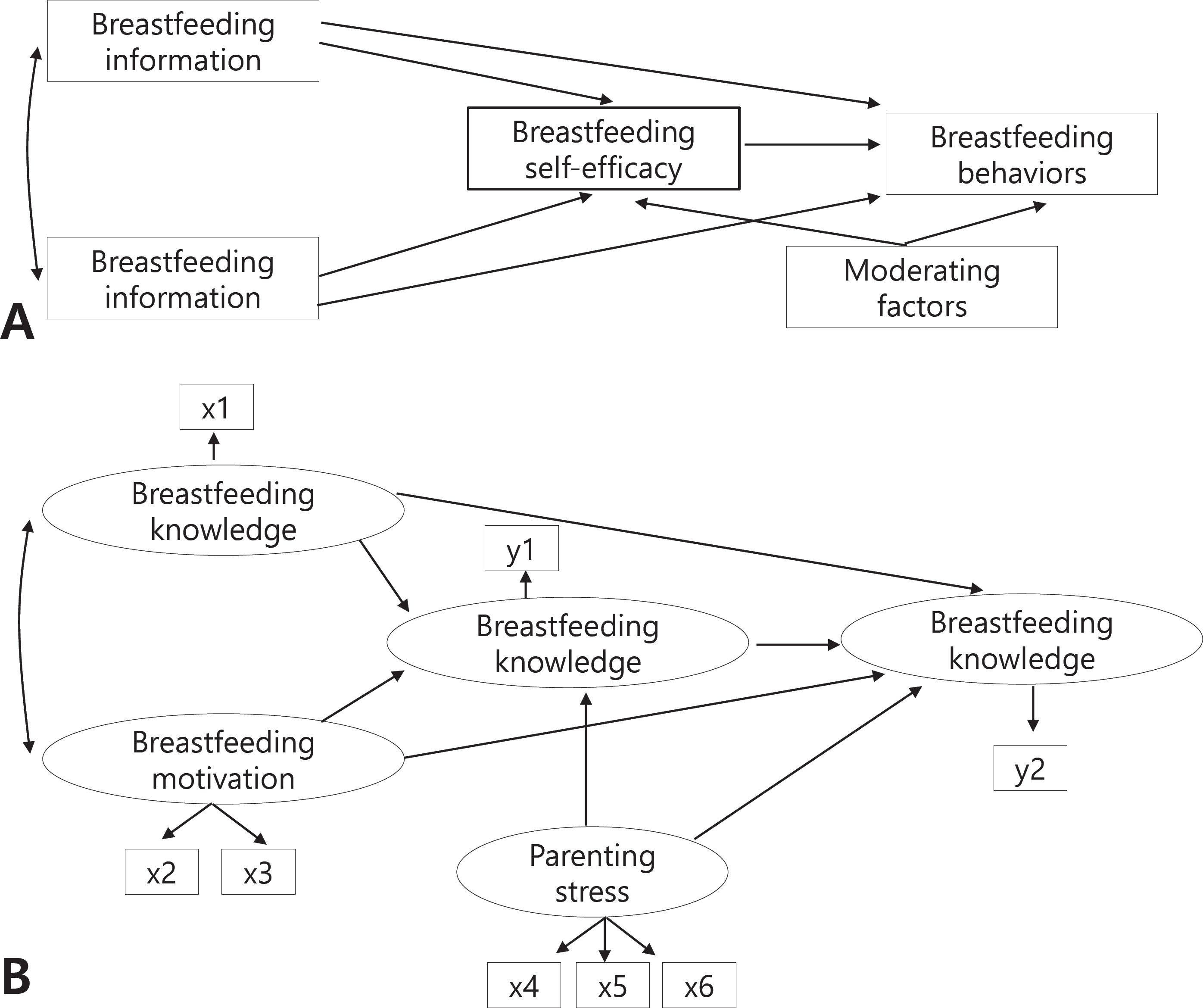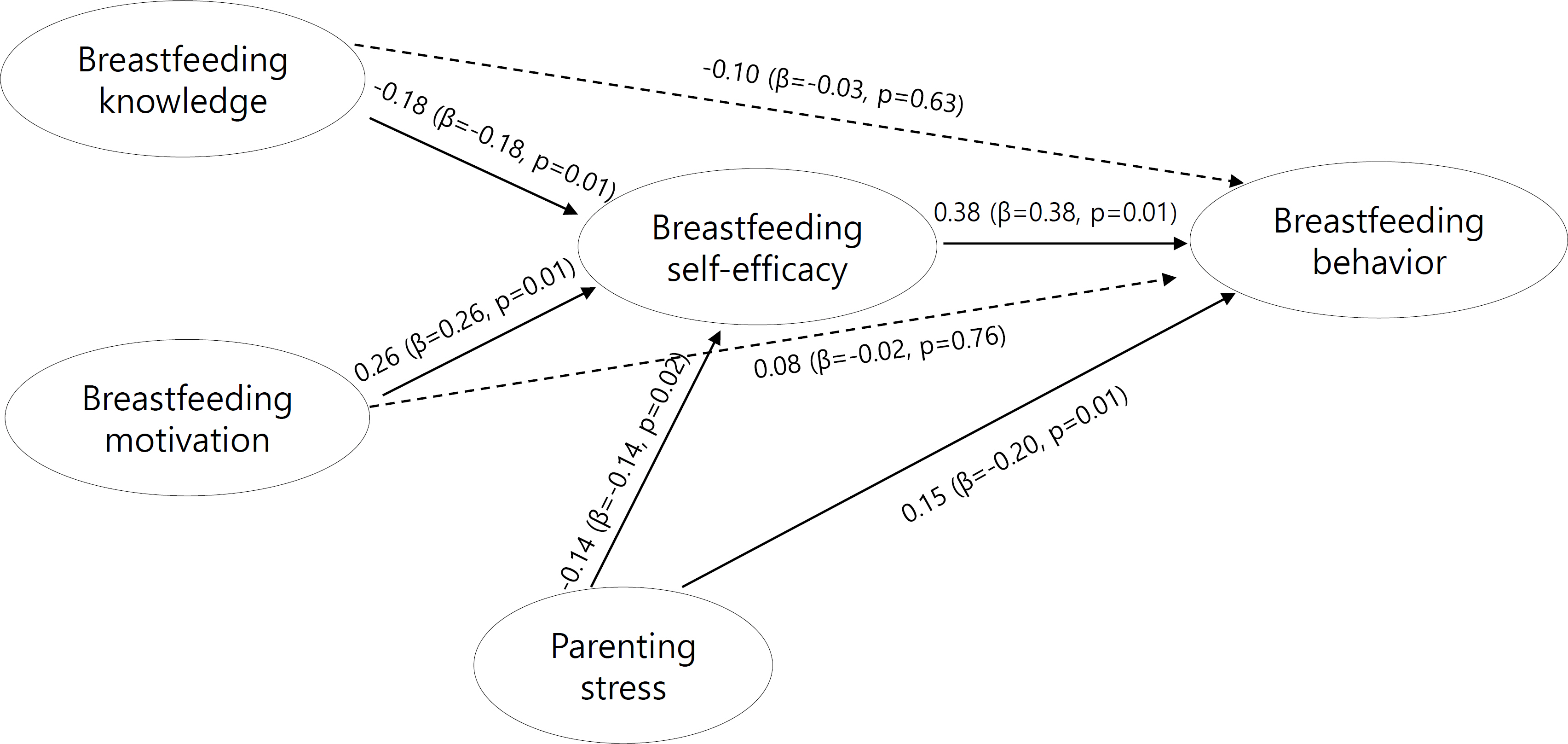J Korean Soc Matern Child Health.
2021 Jul;25(3):184-196. 10.21896/jksmch.2021.25.3.184.
A Structural Model for Breastfeeding Behavior of First-Time Mothers
- Affiliations
-
- 1Department of Nursing MIZ-I Hospital, Mokpo, Korea
- 2Department of Nursing, Mokpo National University, Muan, Korea
- KMID: 2518922
- DOI: http://doi.org/10.21896/jksmch.2021.25.3.184
Abstract
- Purpose
This study aimed to develop a structural model to explain breastfeeding behavior of primipara based on information-motivation-behavioral skills. Variables were breastfeeding knowledge, breastfeeding motivation, breastfeeding self-efficacy, and parenting stress.
Methods
Participants were first-time mothers who were breastfeeding infants from birth to 6 months. Data were collected from 5 pediatric hospitals and 1 public health center in Jeollanam-do from December 24, 2018 to February 28, 2019. A total of 285 questionnaires were included in the analysis. Data were analyzed using IBM SPSS Statistics ver. 20.0 and AMOS 20.0 programs.
Results
Fitness statistics for the hypothetical model were appropriate (χ2=48.30 [degrees of freedom= 14, p<0.001], goodness of fit index=0.96, normed fit index=0.89, comparative fit index=0.92, standardized root mean square residual=0.06). Breastfeeding self-efficacy had the most direct and total impact on breastfeeding behaviors (β=0.38, p=0.01). Breastfeeding self-efficacy was directly and totally influenced by breastfeeding knowledge (β=-0.18, p=0.01), breastfeeding motivation (β=0.26, p=0.01). Parenting stress showed a direct effect on breastfeeding self-efficacy (β=-0.14, p=0.02) and breastfeeding behavior (β=0.20, p=0.01), confirming its modulating effect on both variables.
Conclusion
Since breastfeeding self-efficacy was the most important variable for the breastfeeding behavior in first-time mothers, nursing interventions should be developed to promote breastfeeding selfefficacy including accurate breastfeeding information and enhanced breastfeeding motivation. Strategies that could relieve or adjust parenting stress should be considered since parenting stress had a causal relationship with breastfeeding self-efficacy and breastfeeding behavior.
Figure
Cited by 1 articles
-
Breastfeeding Success Experience of Primiparas
Sun Ok Lee, Sung Soon Na, Hee Sook Kim, Kyung Eui Bae, Mi Sun Youn, Eun Ju Oh
J Korean Soc Matern Child Health. 2022;26(4):254-269. doi: 10.21896/jksmch.2022.26.4.254.
Reference
-
American Academy of Pediatrics, Section on Breastfeeding. Breastfeeding and the use of human milk. Pediatrics. 2012. 129:e827–41.Brockway M., Benzies K., Hayden KA. Interventions to improve breastfeeding self–efficacy and resultant breastfeeding rates: a systematic review and meta–analysis. J Hum Lact. 2017. 33:486–99.
ArticleChan MY., Ip WY., Choi KC. The effect of a self–efficacy–based educational programme on maternal breast feeding self–efficacy, breast feeding duration and exclusive breast feeding rates: a longitudinal study. Midwifery. 2016. 36:92–8.
ArticleChoi EJ., Park EJ., Kim HR., Oh MA., Lee NH., Choi JH. The 2016 national survey on breast feeding. Seoul: Korea Institute for Health and Social Affairs;2016. Report No.: 2016–17.Feldman–Winter L. The AAP updates its policy on breastfeeding and reaches consensus on recommended duration of exclusive breastfeeding. J Hum Lact. 2012. 28:116–7.
ArticleFisher JD., Fisher WA. Changing AIDS–risk behavior. Psychol Bull. 1992. 111:455–74.
ArticleFisher JD., Fisher WA., Amico KR., Harman JJ. An information–motivation–behavioral skills model of adherence to anti-retroviral therapy. Health Psychol. 2006. 25:462–73.
ArticleFisher WA., Fisher JD., Harman J. The information–motivation–behavioral skills model: a general social psychological approach to understanding and promoting health behavior. Suls J, Wallston KA, editors. Social psychological foundations of health and illness. Malden (MA): Blackwell Publishing Ltd.;2003. p. 82–106.
ArticleHa B., Kim S. Exclusive breastfeeding rates and it's influencing factors by the 1st and 6th month of postpartum. J Korea Contents Assoc. 2018. 18:230–40.Heo SH., Noh YG. Impact of parenting stress and husband's support on breastfeeding adaptation among breastfeeding mothers. Korean J Women Health Nurs. 2017. 23:233–42.
ArticleHolden G., Meenaghan T., Anastas J., Metrey G. Outcomes of social work education: the case for social work self–efficacy. J Soc Work Educ. 2002. 38:115–33.Jang MK., Lee SM., Khil JM. Belief factors associated with breastfeeding intentions of single women: based on the theory of planned behavior. J Nutr Health. 2017. 50:284–93.
ArticleKang HC. Analysis of the goodness–of–fit index in the structural equation model and discussion of the model fit strategies. J Korean Data Anal Soc. 2013. 15:653–68.Kestler–Peleg M., Shamir–Dardikman M., Hermoni D., Ginzburg K. Breastfeeding motivation and self–determination theory. Soc Sci Med. 2015. 144:19–27.Kim JE., Park DY. A study on predicting behavioral intention of breastfeeding among primigravida. Korean J Community Nutr. 2001. 6:331–9.Kim M., Lee J., Kim T. The study of relationship between breastfeeding and metabolic syndrome and its components in premenopausal parous women: from the Korean national health and nutrition examination survey, 2010–2016. J Korean Soc Matern Child Health. 2020. 24:154–61.
ArticleKim S., Lee H., Kim S., Kim SY. Effects of prenatal breast self–massage education on breastfeeding self–efficacy, adaptation, and practice in primiparous women. Korean Parent Child Health J. 2017. 20:18–27.Kristensen IH., Simonsen M., Trillingsgaard T., Pontoppidan M., Kronborg H. First–time mothers' confidence mood and stress in the first months postpartum. a cohort study. Sex Reprod Healthc. 2018. 17:43–9.
ArticleLaugen CM., Islam N., Janssen PA. Social support and exclusive breast feeding among canadian women. Paediatr Perinat Epidemiol. 2016. 30:430–8.
ArticleLee HK. Construction of a maternal role acquisition model for first–born mothers during the postpartum period [dissertation]. Seoul (Korea): Seoul National University;1992.Lee J., Bang Y., Bae J. Longitudinal relationship between the child–rearing knowledge, and self–esteem and parenting stress of mothers with a child in infancy. J Open Parents Educ. 2016. 8:27–41.Lee SY., Kim EJ., Park JS., Byun SJ., Oh MA., Lee SR, et al. The 2018 national survey on fertility and family health and welfare. Seoul (Korea): Korea Institute for Health and Social Affairs;2018. Report No.: 2018–37.Maehara K., Mori E., Iwata H., Sakajo A., Aoki K., Morita A. Postpartum maternal function and parenting stress: comparison by feeding methods. Int J Nurs Pract. 2017. 23(Suppl 1):https://doi.org/10.1111/ijn.12549.
ArticleMcQueen KA., Dennis CL., Stremler R., Norman CD. A pilot randomized controlled trial of a breastfeeding self–efficacy intervention with primiparous mothers. J Obstet Gynecol Neonatal Nurs. 2011. 40:35–46.
ArticleMeedya S., Fahy K., Kable A. Factors that positively influence breastfeeding duration to 6 months: a literature review. Women Birth. 2010. 23:135–45.
ArticleMin HY. The effects of hybrid application breastfeeding promotion program for premature infants [dissertation]. Seoul (Korea): Ewha Womans University;2016.Park M., Park KM. Effects of a reinforcement program for postpartum care behavioral skills of couples with their first baby. J Korean Acad Nurs. 2019. 49:137–48.
ArticlePark SH., Ryu S. Effects of breastfeeding interventions on breastfeeding rates at 1, 3 and 6 months postpartum: a systematic review and meta–analysis. J Korean Acad Nurs. 2017. 47:713–30.
ArticleSahin BM., Ozerdogan N., Ozdamar K., Gursoy E. Factors affecting breastfeeding motivation in primiparious mothers: An application of breastfeeding motivation scale based on self–determination theory. Health Care Women Int. 2019. 40:637–52.Shim JI., Kang SJ. Impact of breastfeeding knowledge, attitude, and barriers on breastfeeding practice among twin mothers. Korean J Women Health Nurs. 2017. 23:89–98.
ArticleShiraishi M., Matsuzaki M., Kurihara S., Iwamoto M., Shimada M. Post–breastfeeding stress response and breastfeeding self–efficacy as modifiable predictors of exclusive breastfeeding at 3 months postpartum: a prospective cohort study. BMC Pregnancy Childbirth. 2020. 20:730.
ArticleSong JE. Factors related to the childcare stress among primiparous women who delivered at women's health hospitals. J Korean Soc Matern Child Health. 2009. 13:158–70.Song SM., Park MK. Effects of breastfeeding empowerment program on breastfeeding self–efficacy, adaptation and continuation in primiparous women. J Korean Acad Nurs. 2016. 46:409–19.
ArticleTseng JF., Chen SR., Au HK., Chipojola R., Lee GT., Lee PH, et al. Effectiveness of an integrated breastfeeding education program to improve self–efficacy and exclusive breastfeeding rate: a single–blind, randomised controlled study. Int J Nurs Stud. 2020. 111:103770.
ArticleWilhelm SL., Stepans MBF., Hertzog M., Rodehorst TKC., Gardner P. Motivational interviewing to promote sustained breastfeeding. J Obstet Gynecol Neonatal Nurs. 2006. 35:340–8.
ArticleWong KL., Fong DY., Lee IL., Chu S., Tarrant M. Antenatal education to increase exclusive breastfeeding: a randomized controlled trial. Obstet Gynecol. 2014. 124:961–8.World Health Organization. Exclusive breastfeeding [Internet]. Geneva (Switzerland): World Health Organization;2013 Mar. [cited 2020 Mar 3]. Available from:. http://www.who.int/nutrition/topics/exclusive_breastfeeding/en/.Yang HJ., Seo JM. Concept analysis of effective breastfeeding. Korean J Women Health Nurs. 2011. 17:317–27.
ArticleYu JP. The misunderstanding and prejudice of structural equation models. Seoul (Korea): Hannare Publishing Co.;2014.Yu YR., Park SY. Effect of breast–feeding attitude and breastfeeding practice by individual breast–feeding promotion program. J Korea Acad Ind Coop Soc. 2013. 14:3310–8.
Article



